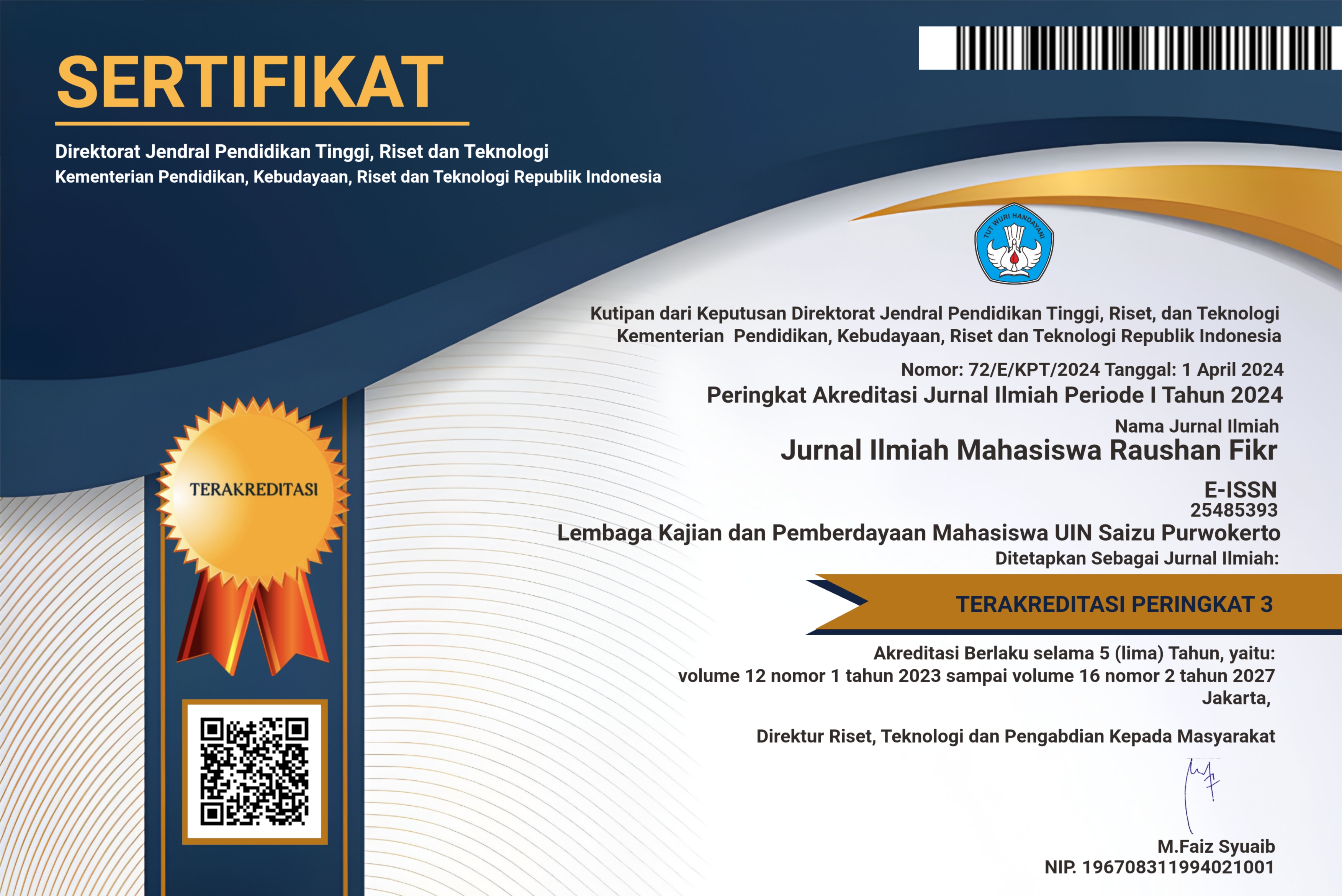Overcoming Islamophobia in Indonesia Through Spiritual Education: An Analysis Based on Iceberg and U-Theory
DOI:
https://doi.org/10.24090/jimrf.v13i1.11489Keywords:
Islamophobia, Iceberg and U-Theory Analysis, Spiritual EducationAbstract
This study explores the gap between the ideals and practical application of spiritual education, focusing on persistent Islamophobia in Indonesia. Ideally, spiritual education fosters tolerance and humanism, accommodating diverse religious expressions like the niqab, burqa, cingkrang pants, and full beards, aligned with Islam’s principles. However, ongoing Islamophobia reveals significant flaws in its implementation. This qualitative literature review synthesizes primary and secondary data from scholarly works over the past decade, using Iceberg and U-Theory methods within a phenomenological framework. The study aims to identify spiritual concepts that mitigate Islamophobia, especially post-2002 Bali terrorism. Findings show that enhancing spiritual education and promoting religious moderation are crucial for reducing Islamophobia by providing accurate understandings of Islamic teachings. Misinterpretations and extremist ideologies, rather than Islam's core tenets, are the root causes of Islamophobic sentimentsDownloads
References
Aceh, A. B. (1996). Pengantar Ilmu Tarekat: Kajian Historis tentang Mistik. Ramadhani.
Amalia, A., & Haris, A. (2019). Wacana islamophobia di media massa. Medium, 7(1), 71–81.
Arianto, A. (2023). Konsep Nasionalisme Michael Sastrapratedja: Sebuah Tinjauan Filsafat Pancasila dalam Rangka Pengembangan Karakter Bangsa. Jurnal Filsafat Indonesia, 6(3), 347–358. https://doi.org/10.23887/JFI.V6I3.44482
Arifa, Simamora, P. S., & Aziz, A. (2022). Menganalisis Bahasa Agama Terhadap Toleransi Dalam Perspektif Islamophobia. Journal.Unj.Ac.Id.
Azra, A. (2002). “Jihad dan Terorisme”, dalam Menggugat Terorisme (Tabrani Sabirin). CV. Karsa Rezeki,.
Hadiyanto, A., Kubro, R., & Samitri, C. (2023). Internalisasi Nilai-Nilai Moderasi Beragama dalam Pembelajaran Al-Qur’an – Hadist di Pesantren. Satwika: Jurnal Pengabdian Kepada Masyarakat, 3(2), 131–141. https://doi.org/10.21009/SATWIKA.030206
Hammad, A. S. Z. al-’Abidin. (2004). Mas’uliyah al-Usrah fi Tahhin al-Syabab min al-Irhab.
Hardiana, I. M. Y., Sushanti, S., & Fasisaka, I. (2014). Kerjasama Kontra-Terorisme Antara Australia Dengan Indonesia Dalam Menanggulangi Ancaman Terorisme Di Indonesia (2002-2008). Jurnal Hubungan Internasional, 1(2), 1–15.
Hawa, S. (1992). Tarbiyatu al-Ruhiyah. Maktabah al-Wahbah.
Kambali, K., Ayunina, I., & Mujani, A. (2019). Tujuan Pendidikan Islam Dalam Membangun Karater Siswa Di Era Digital (Studi Analisis Pemikiran Pendidikan Islam Abuddin Nata). Risâlah, Jurnal Pendidikan Dan Studi Islam, 6(1), 1–19. https://doi.org/10.31943/jurnal_risalah.v6i1.106
Kementerian Agama RI. 2016. Tafsir Ringkas Al-Qur’an Al-Karim (Tafsir Wajiz) Jilid 2 Bagian 1. Jakarta: Lajnah Pentashihan Mushaf Al-Qur’an.
Machrus, Moh. A. (2020, Desember). Workshop Moderasi Beragama Sesi 3. Iceberg Analysis & U-Process. https://uin-suka.ac.id/id/berita/detail/619/workshop-moderasi-beragama-sesi-3-iceberg-analysis-u-process
Moordiningsih. (2004). Islamophobia dan Strategi Mengatasinya. In Buletin Psikologi.
Hernawati, S., Hafizh, M., Nurfaizi, M., & Rahardja, A. (2024). Adjusting the Ideal Islamic Religious Education Curriculum to the Development Of AI-Based Technology. PROGRESIVA: Jurnal Pemikiran Dan Pendidikan Islam, 13(01), 137–152. https://doi.org/10.22219/progresiva.v13i01.32931
Muhtadi, M. (2021). Pendidikan Humanistik Dalam Perspektif Al-Qur’an. Alashriyyah, 7(01), 37–54. https://doi.org/10.53038/alashriyyah.v7i01.140
Pendidikan, K., Dalam, P.-H., Pemikiran, B., Dur, G., Kurniawan, D., & Muzakki, A. (2022). Konsep Pendidikan Pluralis-Humanis Dalam Bingkai Pemikiran Gus Dur. Tarbawiyah: Jurnal Ilmiah Pendidikan, 5(2), 235–247. https://doi.org/10.32332/TARBAWIYAH.V5I2.4382
Pringgar, R. F., & Sujatmiko, B. (2020). Penelitian Kepustakaan (Library Research) Modul Pembelajaran Berbasis Augmented Reality Pada Pembelajaran Siswa.
Republika. (2004). Di Negeri Seberang pun Dicurigai. 3 Oktober 2004.
Rosad, A. M. (2019). Implementasi Pendidikan Karakter Melalui Managemen Sekolah. Tarbawi: Jurnal Keilmuan Manajemen Pendidikan, 5(02), 173. https://doi.org/10.32678/tarbawi.v5i02.2074
Salenda, K. (2009). Terorisme Dalam Perspektif Hukum Islam. Ulumuna, 13(1), 81–108.
Satori, A., & Widiastuti, W. (2018). Model Pendidikan Multikultural Pada Pesantren Tradisional Di Kota Tasikmalaya Dalam Mencegah Ancaman Radikalisme. Sosiohumaniora, 20(1), 22–28. https://doi.org/10.24198/SOSIOHUMANIORA.V20I1.10304
Sisdiknas. (2003). Undang-Undang Nomor 20 Tahun2003.
Sugiyono, D. (2013). Metode Penelitian Kuantitatif, Kualitatif, dan Tindakan.
Tafsir Web. (n.d.). In Tafsir Ringkas Kementrian Agama RI / Surat Al-Anbiya Ayat 107. https://tafsirweb.com/5619-surat-al-anbiya-ayat-107.html
Windiani, R. (2018). Peran Indonesia Dalam Memerangi Terorisme. Jurnal Ilmu Sosial, 16(2), 135–152. https://doi.org/10.14710/JIS.16.2.2017.135-152
Witro, D., & Alamin, N. (2021). Grounding Islam Moderation Through Social Media: A Form To Prevent Islamophobia In Indonesia. Tatar Pasundan: Jurnal Diklat Keagamaan, 15(2), 145–153. https://doi.org/10.38075/TP.V15I2.230
Yusuf, A. M. (2017). Metode Penelitian Kuantitatif, Kualitatif, dan Penelitian Gabungan. Kencana, Penerbit.
Downloads
Published
How to Cite
Issue
Section
License
Copyright (c) 2024 Muhammad Rifqi Zam Zami, Muhammad Hafizh, Dinda Helmi Kayana Juwita

This work is licensed under a Creative Commons Attribution-NonCommercial-ShareAlike 4.0 International License.
Authors who publish with this journal agree to the following terms:
- Authors retain copyright and grant the journal right of first publication with the work simultaneously licensed under a Creative Commons Attribution-NonCommercial-ShareAlike 4.0 International License that allows others to share the work with an acknowledgement of the work's authorship and initial publication in this journal.
- Authors are able to enter into separate, additional contractual arrangements for the non-exclusive distribution of the journal's published version of the work (e.g., post it to an institutional repository or publish it in a book), with an acknowledgement of its initial publication in this journal.
- Authors are permitted and encouraged to post their work online (e.g., in institutional repositories or on their website) prior to and during the submission process, as it can lead to productive exchanges, as well as earlier and greater citation of published work (See The Effect of Open Access).
















